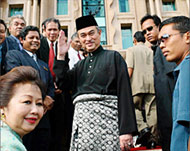Malaysia PM throws down election gauntlet
Malaysia’s new prime minister has called a snap national election that will pit the long-ruling secular coalition government against an Islamic opposition.

The polls will be Prime Minister Abd Allah Ahmad Badawi’s first electoral test since taking over in October, when Mahathir retired after 22 years in power.
No specific date has been set, but the ballot is expected in the next two or three weeks.
The nation’s constitutional monarch King Sayyid Siraj al-Din signed a decree dissolving parliament as of Thursday.
The elections will be a make-or-break for the PM, and will signal whether Islamist parties are making headway in a multi-ethnic but Muslim-dominated country of 25 million people.
Change of image
Badawi has sought to distance himself from the Mahathir era, launching a popular crackdown on corruption in government and industry.
He also shelved some big projects connected to a Mahathir-linked tycoon and promised a more open and accountable government.
 |
|
Badawi’s party likely to win, but |
But his image has been dented by allegations from opposition groups that a police investigation into the trafficking of nuclear parts to Libya was whitewashed to protect his son, who controls the company involved.
Commission decision
The election commission will meet in four days to fix the dates for nominating candidates and holding the polls, chairman Abd Al-Rashid Abd Al-Rahman told a news conference.
Agus Yusuf, a political lecturer at the National University of Malaysia, said he expected the polling date to be within three weeks.
Voters will select 219 members of a new federal parliament and 505 representatives of legislatures in 12 of Malaysia’s 13 states.
The government’s five-year term is not due to expire until November, but a snap election has been widely expected since Badawi took power.
His United Malays National Organisation (UMNO) leads a 14-party ruling coalition that holds 152 of the 193 seats in the current parliament and has almost no chance of losing power.
Balance of power
|
Malaysia Facts Population: 25 million Geographic area: 330,000sq km Religions: 60% Muslim, 20% Buddhist, nine per cent Christian, seven per cent Hindu Political system: Parliamentary democracy with constitutional monarchy GDP: $101.5bn in 2003 Unemployment: 3.5% in 2003 Growth and inflation: 4.5% and 1.1% in 2003 respectively |
UMNO, which has supplied every prime minister since Malaysia’s independence from Britain in 1957, faces stiff competition from the Pan-Malaysia Islamic party for support among ethnic Malay Muslims, who comprise about two-thirds of the population.
The Islamic party made strong inroads against UMNO at the last election in 1999.
It took control of a second state in the conservative Muslim-dominated northeast. It has vowed to hold both states and win control of at least one more.
The Islamic party’s earlier gains came amid political turmoil in UMNO and widespread anger at Mahathir for the way he put down a challenge by his popular deputy, Anwar Ibrahim, who was jailed on sodomy and corruption charges. Ibrahim’s supporters say the charges were politically motivated.
Other issues
Qamar al-Din Jaafar, a senior member of the Islamic party, said they would also make the nuclear deal a campaign issue.
“The government has been quick to put away people on mere allegations they were involved in militant activities, yet nothing is done when evidence is produced against Abd Allah’s own son.”
It will also seek to tie Badawi to corruption and abuse of power it claimes were hallmarks of Mahathir’s rule.
The PM must also face internal party elections later this year, and poor results for UMNO in the general elections could make him vulnerable to a challenge.